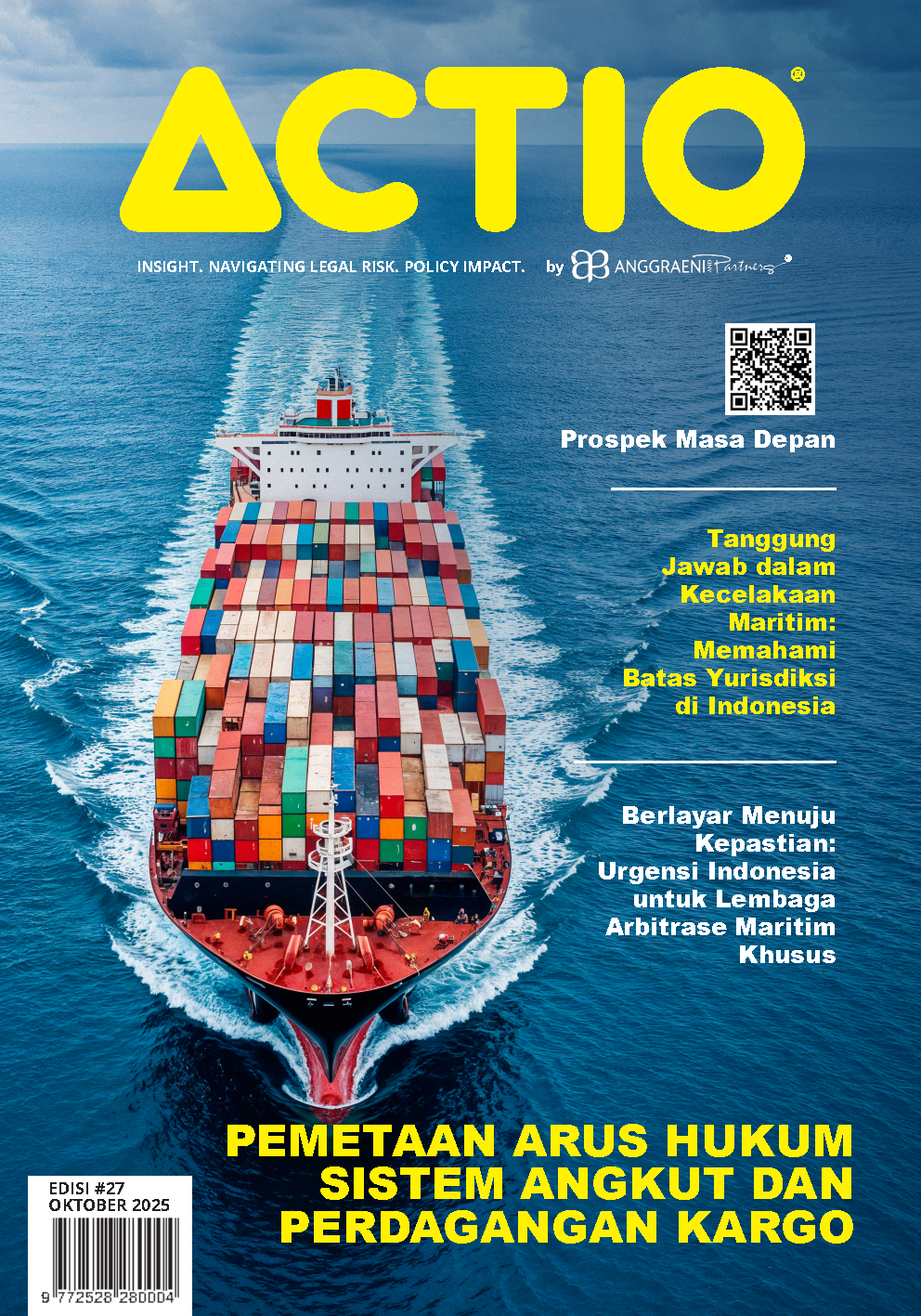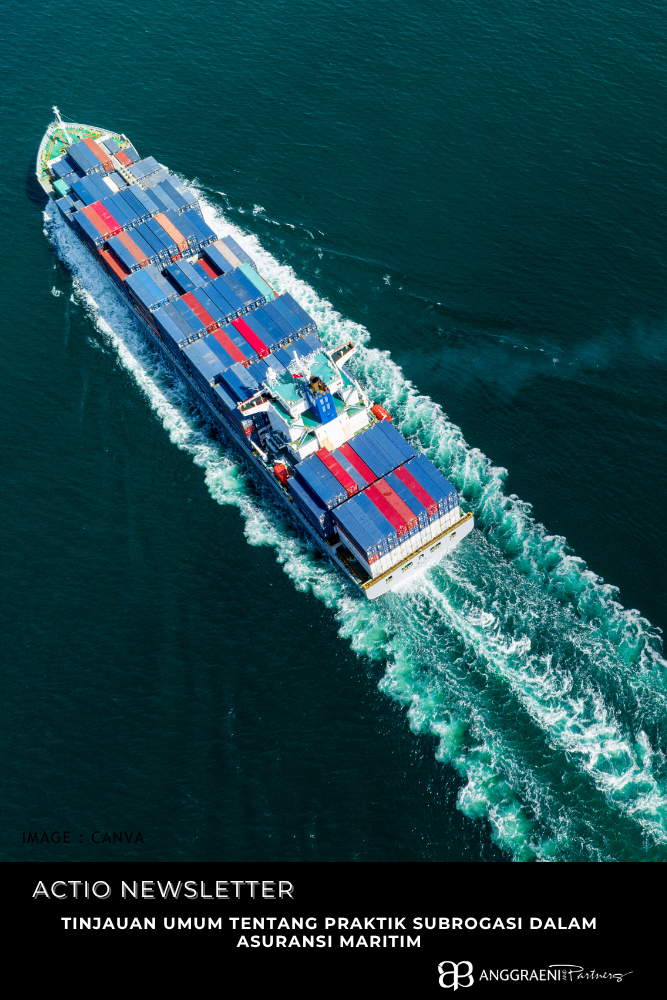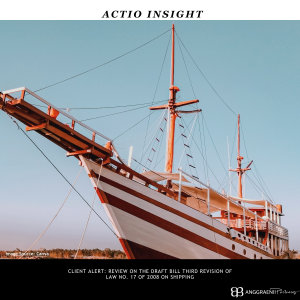CLIENT ALERT: REVIEW ON THE DRAFT BILL THIRD REVISION OF LAW NO. 17 OF 2008 ON SHIPPING
by Setyawati Fitrianggraeni, Orima Melati Davey and Alicia Daphne Anugerah*
INTRODUCTION
Indonesia is an archipelagic country, unified by vast maritime areas with boundaries and rights established by law. In the effort to achieve national goals based on Pancasila and the 1945 Constitution of the Republic of Indonesia, to realize the vision of Nusantara and strengthen national resilience, a national transportation system is essential to support economic growth, regional development, and reinforce the sovereignty of the Republic of Indonesia.[1] Law Number 17 of 2008 on Shipping is 16 years old, and hence requires amendments to address society’s progressive needs and current developments. Therefore, on 30 September 2024, The House of Representatives of the Republic of Indonesia (DPR-RI) officially ratified the Third Amendment to Law Number 17 of 2008 on Shipping. Key changes include the enhancement of regulations to support traditional maritime transport, provisions governing public service obligations, strengthening the cabotage principle through joint venture regulations in water transport, regulation of related service businesses as joint ventures, financial and tax incentives to empower the maritime transport and shipbuilding industries, involvement of service provider and user associations in determining port service tariffs set by port operators, governance over the registration of vessels in joint ventures, oversight of pilotage services and the use of tugboats, streamlining of port bureaucracy, and strengthening the oversight of maritime navigation functions. This review will elaborate the differences between two instruments per relevant categories, and what potential impacts will be expected from these revisions. The amendment to Law No. 17 of 2008 provides thorough measurement for risk and safety standards. Understanding the transition will be beneficial for companies to adapt and secure much required stability in the near future.
OVERVIEW OF CLEARER REGULATORY FRAMEWORK FOR CABOTAGE
The Shipping Law Number 17 of 2008 initially required a joint venture between national sea transport company and foreign sea transport company to own a vessel of at least 5000 gross tonnages. The new bill on shipping law now requires a joint venture shipping company to own a vessel of at least 50,000 gross tonnages. From this clause, the Indonesian government wants to minimize the possibility of a foreign aspect regarding the ownership of the vessel. Further, the new shipping law bill requires Indonesian sea transport companies to own most of the shares, and the majority of the shares must be owned by Indonesian sea transport company. This regulation brings significant implications for any foreign or international shipping company wishing to enter a joint venture with an Indonesian shipping company. This new regulation also indirectly encourages national shipping companies to increase ownership of vessels.
EMPOWERMENT OF PELAYARAN RAKYAT (TRADITIONAL SHIPPING)
In the empowerment of Pelayaran Rakyat or Traditional Shipping, the previous law regulates this category in Articles 15-16 that mainly describe on the definition, empowerment, and development of traditional shipping. In the new draft bill, the law strengthens regulations around Pelayaran Rakyat, based on the elaboration of five more articles in between Article 15-16. These additional articles promote traditional vessels with new design standards and specifications for safety and environmental sustainability. For example, there are required standards and specifications on Pelayaran Rakyat including adequate materials, chambers, measurements based on types of transportation and standard design. In terms of empowerment, the articles provide detailed information on empowerment types, involving development on human resources, vessels, shipyards, and cargo capacity. The draft bill also outlines incentives for traditional shipping to boost connectivity to remote regions from regency/city, province, and national government. This comparison illustrates a defined parameter on maritime safety towards pelayaran rakyat which was not provided prior. Another significant change is that according to the bill draft, companies operating in smaller-scale shipping may benefit from new government support, particularly for service in underserved regions.
STRENGTHENING INDONESIA’S COASTAL AND MARITIME DEFENSE UNDER THE MINISTRY’S OVERSIGHT
Referring to the Shipping Law Number 17 of 2008, the Sea and Coast Guard in Indonesia is described as an entity with an obligation to ensure safety and security of shipping, to ensure orders in salvage activity, marine patrol, and conduct hot pursuit.[2] On the other hand, there is also the Bakamla (Maritime Safety Agency), Indonesian Navy, and Water Police which for the most part has the same role as the Sea and Coast Guard.[3] These overlapping authorities create uncertainty for the maritime industry and certainty to the legal aspects of maritime as a whole. Indonesian government revisits this issue in the new draft bill, determining a clearer role for monitoring and ensuring the safety and security of maritime, especially in the shipping sector. Indonesian government has discontinued the notion and duty of Sea and Coast Guard, delegating it to the minister who organizes government affairs in shipping sector. To add, the new draft bill clarifies the mechanism of maritime claim. The new draft bill has dropped the clause stating that the arrest of a vessel must be carried out in accordance with the regulation of the Minister of Transport and mandating the mechanism of vessel arrest to be in accordance with the laws and regulation. The removal of this clause has answered the ambiguity that has been circulating, as the Minister of Transportation’s regulation regarding the procedures of vessel arrest never existed.
REVISED PENALTIES AND SANCTIONS
The draft bill introduces higher administrative sanctions for non-compliance with shipping and port regulations, including vessel detention for unresolved maritime claims and safety violations. In the previous shipping law, Article 284 regulates that each person that operates a foreign ship to transport people/good between islands or ports in the Indonesian waters are sentences to maximum five years of prison and fined maximum 600 million IDR. This Article is then revised to maximum eleven years of prison and fined maximum based on category VII, which amounts to 5 billion IDR.[4] This significant change in sanctions expresses more coercion towards companies that violate the provision. In other words, companies must ensure full compliance with regulations on safety, insurance, and environmental standards to avoid severe penalties.
INFRASTRUCTURE DEVELOPMENT FOR PELAYARAN-PERINTIS
The current Shipping Law Number 17 of 2008 does not elaborate much on the obligation to provide port infrastructure. However, the new draft law introduces a new obligation for the government to provide not only physical infrastructure and port facilities through, but the government is also mandated to provide vessels for Pelayaran-Perintis. The new mandate ensures a robust development of the maritime sector as it is mandated to improve the overall quality of Indonesian ports.
CONCLUDING REMARKS
Based on the review above, it is concluded that companies intertwined with the shipping sector must ensure compliance with these amendments and take advantage of new opportunities. Thus, we recommend that all maritime operators:
- Review joint venture agreements and ensure vessel registration aligns with the new cabotage requirements.
- Explore potential incentives for Pelayaran Rakyat services if operating smaller vessels in regional routes.
- Implement immediately safety requirements on Pelayaran Rakyat
- Assess current compliance protocols related to vessel safety and port usage to avoid penalties under stricter enforcement measures.
Footnotes :
[1] Simon Ito, ‘Kewenangan PPNS Syahbandar Dalam Tindak Pidana Pelanggaran Undang-Undang Nomor 17 Tahun 2008 Tentang Pelayaran’ (2021) 3 BalRev 224, 227 <https://garuda.kemdikbud.go.id/documents/detail/2738613>.
[2] Shipping Law 17/2008, Art. 276-278.
[3] Marine Affairs Law 32/2014, Art. 59(3); Indonesian National Armed Forces Law 34/2004, Art. 9; Regulation of the Chief of the National Police of the Republic of Indonesia Number 1 of 2019 concerning the system, management and operational success standards of the National Police of the Republic of Indonesia, Annex.
[4] Indonesian Criminal Code 1/2023, Art. 79(g).
DISCLAIMER :
This disclaimer applies to the publication of articles by Anggraeni and Partners. By accessing or reading any articles published by Anggraeni and Partners, you acknowledge and agree to the terms of this disclaimer:
During the preparation of this work, the author(s) may use AI-assisted technologies for readability. After using this tool/service, the author(s) reviewed and edited the content as needed for the purposes of the publication.
No Legal Advice: The articles published by Anggraeni and Partners are for informational purposes only and do not constitute legal advice. The information provided in the articles is not intended to create an attorney-client relationship between Anggraeni and Partners and the reader. The articles should not be relied upon as a substitute for seeking professional legal advice. For specific legal advice tailored to your individual circumstances, please consult a qualified attorney.
Accuracy and Completeness: Anggraeni and Partners strive to ensure the accuracy and completeness of the information presented in the articles. However, we do not warrant or guarantee the accuracy, currency, or completeness of the information. Laws and legal interpretations may vary, and the information in the articles may not be applicable to your jurisdiction or specific situation. Therefore, Anggraeni and Partners disclaim any liability for any errors or omissions in the articles.
No Endorsement: Any references or mentions of third-party organizations, products, services, or websites in the articles are for informational purposes only and do not constitute an endorsement or recommendation by Anggraeni and Partners. We do not assume responsibility for the accuracy, quality, or reliability of any third-party information or services mentioned in the articles.
No Liability: Anggraeni and Partners, its partners, attorneys, employees, or affiliates shall not be liable for any direct, indirect, incidental, consequential, or special damages arising out of or in connection with the use of the articles or reliance on any information contained therein. This includes but is not limited to, loss of data, loss of profits, or damages resulting from the use or inability to use the articles.
No Attorney-Client Relationship: Reading or accessing the articles does not establish an attorney-client relationship between Anggraeni and Partners and the reader. The information provided in the articles is general in nature and may not be applicable to your specific legal situation. Any communication with Anggraeni and Partners through the articles or any contact form on the website does not create an attorney-client relationship or establish confidentiality.
By accessing or reading the articles, you acknowledge that you have read, understood, and agreed to this disclaimer. If you do not agree with any part of this disclaimer, please refrain from accessing or reading the articles published by Anggraeni and Partners.
For further information, please contact:
P: 6221. 7278 7678, 72795001
H: +62 811 8800 427
Anggraeni and Partners, an Indonesian law practice with a worldwide vision, provides comprehensive legal solutions using forward-thinking strategies. We help clients manage legal risk and resolve disputes on admiralty and maritime law, complicated energy and commercial issues, arbitration and litigation, tortious claims handling, and cyber tech law.
S.F. Anggraeni
Managing Partner
Orima Melati Davey
Researcher
Ocean-Maritime-Climate Research Group
orima.md@ap-lawsolution.net




